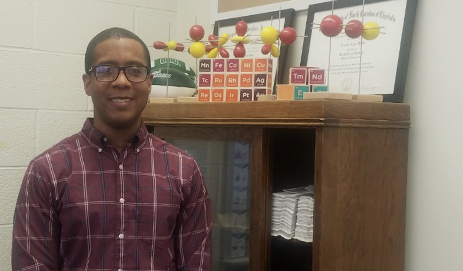
Dr. Travis White in his office in Clippinger Laboratories
By Amanda Biederman, Ph.D.
NQPI writer
Nanoscale and Quantum Phenomena Institute 2019 Fall Newsletter
Travis White first became interested in solar energy, the process of how light deposits energy in materials, after completing a one-semester research course on the photochemistry of beer as an undergraduate student.
“I had just turned 21,” explained White, now an assistant professor of Chemistry & Biochemistry at Ohio University. “But I hadn’t realized that light actually plays an important role (in beer production).”
Today, White’s group is working to design chemical systems to convert solar energy into a new form for later use. White recently joined the faculty of the Nanoscale and Quantum Phenomena Institute, and he is currently working to design molecules that can be used to absorb light more efficiently.
White said the principle of his research is based on photosynthesis, the process in which plants harness light to produce energetic fuels (i.e., sugar). Solar energy technology is considered “green energy,” as it is renewable and does not result in the emission of harmful greenhouse gases.
Much like the leaves of a tree are important for absorbing the light needed for photosynthesis reactions, White is working to develop compounds that can absorb light for use in electrical systems. White explained that although this process may sound simple in theory, the development of a solar energy system presents unique challenges.
“Basically, we want to mimic what nature does. And it’s hard, a lot harder than it seems,” White said. “Nature has had billions and billions of years to evolve. We’ve been trying to catch up in the last 30 to 40 years.”
White said he looks forward to future collaborations with NQPI members with expertise in materials-based research. In the future, White plans to collaborate with Chemistry & Biochemistry professor and NQPI member Jixin Chen to develop solar cells that can absorb light energy.
Although White noted that his research is currently in the fundamental stage, the application of cheaper, more efficient light absorbers may help to make solar energy methods more feasible at a commercial scale in the future.



















Comments